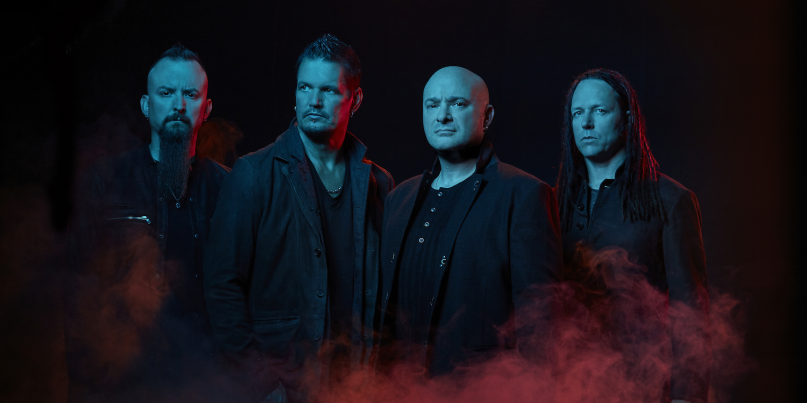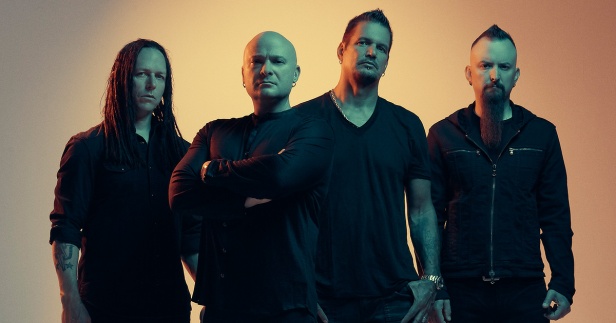David Draiman still finds what to be disturbed
about
For Disturbed frontman, his band’s first
appearance in Israel
By David Brinn
DISTURBED,
WITH David Draiman (third from left), will be making their Israel CAA LONDON
It’s a tossup as to who’s more
excited about the upcoming concert in The 46-year-old frontman with bald pate and until recently – an impressive array of imposing chin piercings – is one of the entertainment world’s few outspoken defenders of the Jewish state. His usual intense but articulate manner of speech is peppered with excitement over the prospects of his first show in the
“I can’t wait!
It’s going to be a special night,” said Draiman, who has visited the country
numerous times. “We have some really incredible surprises in store for the
Israeli crowd. I always look forward to coming. You can’t but help feel
different when you’re in Israel
Draiman, who was raised inChicago Israel Israel
“It’s a huge backstage list, it’s going to be insane,” laughed Draiman during a recent phone interview fromGlasgow Israel
The same voice heard belting out Disturbed angst-ridden lyrics used to regularly inspire teenage yeshiva students inChicago
Instead, he’s become world famous with Disturbed. Along with band mates, guitarist/keyboardist Dan Donegan, bassist John Moyer and drummer Mike Wengren, they’ve sold millions of albums since their 2000 debut and, in 2015, cracked the mainstream with a passionate version of Simon & Garfunkel’s “The Sound of Silence” that shattered the heavy metal stereotype the band had fostered.
According to Draiman, the song’s success, rather being a warhorse that he has to pull out at every show, has had a liberating effect.
“That song’s success was a surprise, but it was in no way, shape or form a burden,” he said. “We knew we had something special when we recorded it. Listening to it, we know how much it affected us, and we could only assume other people would find the same connection to it, and thankfully we were right.”
“Stylistically, it opened up opportunities for us,” he continued. “Danny and I had talked about doing an acoustic record for years, and ‘The Sound of Silence’ gave us the confidence to start our creative process for [2018 album] Evolution by concentrating on ballads and acoustic material first as opposed to starting with the heavy stuff right out of the gate. Those songs, like ‘A Reason to Fight’ and ‘Hold on to Memories’ have become some of the pinnacles of our live show, and certainly ‘Sound of Silence,’ which I think fans would riot if we didn’t perform.”
The song’s success has also enabled the band to expand its fan base, which in turn opened up new markets for them, includingIsrael
“The band knows I’ve wanting to do this our entire career, but it was just a matter of working things out logistically,” said Draiman. “Touring is very expensive, and I can convince the guys to come over and not make money, but I can’t convince them to come over and take a loss. There’s not a lot of ways to bridge the physical gap betweenIsrael
“It becomes complicated, but this time we were able to bridge that gap by doing a bunch of shows as a lead up that made sense geographically and strategically,” he said. “And we’re finally popular enough inIsrael
Draiman, who was raised in
“It’s a huge backstage list, it’s going to be insane,” laughed Draiman during a recent phone interview from
The same voice heard belting out Disturbed angst-ridden lyrics used to regularly inspire teenage yeshiva students in
Instead, he’s become world famous with Disturbed. Along with band mates, guitarist/keyboardist Dan Donegan, bassist John Moyer and drummer Mike Wengren, they’ve sold millions of albums since their 2000 debut and, in 2015, cracked the mainstream with a passionate version of Simon & Garfunkel’s “The Sound of Silence” that shattered the heavy metal stereotype the band had fostered.
According to Draiman, the song’s success, rather being a warhorse that he has to pull out at every show, has had a liberating effect.
“That song’s success was a surprise, but it was in no way, shape or form a burden,” he said. “We knew we had something special when we recorded it. Listening to it, we know how much it affected us, and we could only assume other people would find the same connection to it, and thankfully we were right.”
“Stylistically, it opened up opportunities for us,” he continued. “Danny and I had talked about doing an acoustic record for years, and ‘The Sound of Silence’ gave us the confidence to start our creative process for [2018 album] Evolution by concentrating on ballads and acoustic material first as opposed to starting with the heavy stuff right out of the gate. Those songs, like ‘A Reason to Fight’ and ‘Hold on to Memories’ have become some of the pinnacles of our live show, and certainly ‘Sound of Silence,’ which I think fans would riot if we didn’t perform.”
The song’s success has also enabled the band to expand its fan base, which in turn opened up new markets for them, including
“The band knows I’ve wanting to do this our entire career, but it was just a matter of working things out logistically,” said Draiman. “Touring is very expensive, and I can convince the guys to come over and not make money, but I can’t convince them to come over and take a loss. There’s not a lot of ways to bridge the physical gap between
“It becomes complicated, but this time we were able to bridge that gap by doing a bunch of shows as a lead up that made sense geographically and strategically,” he said. “And we’re finally popular enough in
IN RECENT YEARS, Draiman has toned down his online presence and public defense of
“I don’t engage publicly anymore, unfortunately it invited all kinds of negative attention,” he said. “Twitter is a cesspool and there’s no point in engaging there – it’s a playground for packdogs and juveniles in a contest to see who has the better insult.”
“I do all kinds of behind the scenes stuff now. I sit on the advisory board of the Creative Community for Peace [an entertainment industry organization],” Draiman said. “We get heavily involved in trying to make sure that bands who have shows coming up in Israel or are considering to perform there feel comfortable about and understand the pushback is just a lot of noise. Whatever temporary negative backlash there may be is outweighed by the passion and exuberance and loyalty of their Israeli fan base.”
The pushback against Israel and the rising tide of antisemitism comes from both the extreme Left and Right, according to Draiman, who calls it “scary times.”
“It’s terrifying, worse than I’ve ever seen in my lifetime. I never thought I would see the day when people were literally being attacked once again, when antisemitism is becoming mainstream,” he said, citing the infamous New York Times cartoon earlier this year, alt-Right marches and continued antisemitic statements by Louis Farrakhan.
“‘Never again’ has never had so much meaning and yet people are forgetting it,” he said. “People are even questioning the validity of the numbers behind the Holocaust. It’s mind-boggling to me.”
However, Draiman doesn’t lay the blame at the doorstep of any one source, including US President Donald Trump.
“It’s not just the Trump era,” he said. “The country was divided before him, whether people want to admit it or not. I think that Trump is given too much credit. The hatred exists with or without him. It continues to fester and not enough is being done to bring people together. We’re way too polarized and partisan these day, and I don’t think laying the responsibility at the feet of Trump does it justice.”
With his chin piercings gone (“it was time,” he told one interviewer recently), a seven-year-old son, a defunct Twitter feed and a nearly 20-year-career in full swing, Draiman has shifted his priorities from the global to the personal.
“Having a child changes your entire world. You start prioritizing differently, for yourself, for your livelihood. You become a lot more protective and defensive and try to wield what you were given as responsibly as possible,” he said, adding that the changes have begun to be reflected in his lyrics. “Age, experience and family will continue to push you in different directions. I have different concerns now, and not to be cliché, but we evolve. As an artist, I try to write from the heart.”
And finally, Israeli fans, like the rest of the world, have begun to take Disturbed to heart. On July 2 in Rishon, don’t expect to hear many sounds of silence.



Chat About Disturbed Squash Mental Health Stigmas With 'A Reason To Fight' Town Hall